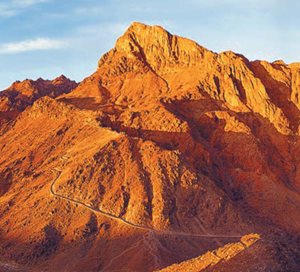Answering one of God’s favourite questions
What are you doing here? It’s a question that gets a lot of airtime in my head.
For example, I’ve asked it when I’ve walked with purpose into some area of my house, only to forget what object I intended to retrieve there.
I’ve also asked it after I’ve found myself (alarmingly often) on the wrong side of the Fraser River, having daydreamed my way past the last exit on the highway before the bridge.
I’ve even been known to ask it (philosophically, rather than geographically) while standing at my pantry door, more restless than hungry, reaching for a bag of chips.
What are you doing here?
It’s a good question. Strikingly, it’s the exact question God asks the prophet Elijah not once, but twice in their famous cave exchange in 1 Kings 19.
You likely know the story. Elijah has just enjoyed the sweetest possible victory in his showdown with idolatrous prophets at Mount Carmel. But his celebration has been cut short by death threats, and he has plunged into an emotional crash as spectacular as his recent triumph.
"I have had enough, Lord," he moans (v. 4). "Take my life."
The Lord, of course, preserves his life instead, sending angels with cake (yes, cake!) and water to keep him going. Still, Elijah’s mood does not improve, and after a 40-day journey he hunkers down in both a literal and psychological cave at Mount Horeb.
It’s after his first night in the cave that the Lord asks him the question. "What are you doing here, Elijah?" (v. 9).
Elijah answers accusingly, explaining his zeal for the Lord has gotten him nothing but isolation and trouble.
In response the Lord tells him to go stand outside. Elijah obliges and gets to witness Yahweh at the height of His poetic powers.
First there is a gale-force wind. But the Lord is not in the wind.
Then there is a major earthquake. But the Lord is not in the earthquake.
Next there is a five-alarm fire. But the Lord is not in the fire.
Finally there is a gentle whisper. (The Hebrew describes it as "a voice of gentle silence," notes Charles Spurgeon in an 1882 sermon, "as if silence had become audible.")
In the audible silence Elijah recognizes God. At last he’s ready to have a conversation with the Lord.
That’s when the Lord says again, "What are you doing here, Elijah?" (v. 13).
The omniscient God knows, of course, the exact sequence of events that brought Elijah to his literal cave. He also knows the precise progression of thoughts that landed Elijah in his psychological one.
So the repeated question must be more for Elijah’s benefit than for the Lord’s. Intriguingly, Elijah answers the same way both times, but something has shifted post-whisper. By the end of the conversation, he’s ready to take his next steps with God.
"What are you doing here?" is a question that has the power to awaken and disrupt. It forces the one being asked to stop, take notice of where they are and assess whether they are where they want to be. It invites us to retrace, if necessary, the steps that led to our current location, and to explore the path we might take to go somewhere else.
It’s a question the Lord asks each one of us, I am coming to suspect, as repeatedly as we ask it of ourselves – but with far more love and benevolence. Where we might shout it at ourselves while shaking our heads, He tends to ask it in a gentle whisper, transforming our disorientation and restlessness into invitation.
I mention all this to explain why, once a day, I am trying to take 15 minutes to sit in the sort of stillness that can make silence audible. The Lord and I converse, reviewing the last 24 hours, following the prayer rhythm known classically as the examen. I almost always emerge with a better understanding of where I am and how I got there. Sometimes, thanks be to God, I discover which steps to take next.
I am still, however, hoping for cake.